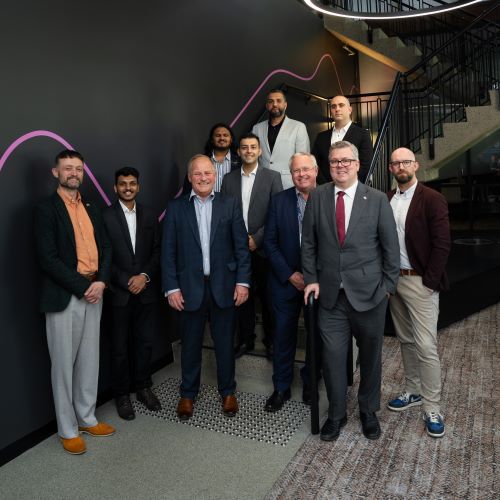21 November 2025

2025 Venture Catalyst Space cohort with Craig Jones (Deputy Director: Business Incubation, UniSA), Peter Stevens (Executive Director, Industry and Government, UniSA), Professor Peter Murphy (Deputy Vice Chancellor: Research and Enterprise, UniSA) and the Hon Michael Brown MP
Six space startups are charting new frontiers in satellite communications, in-orbit services and space data analytics, as they graduate from the University of South Australia’s 2025 Venture Catalyst Space accelerator program.
The program, run by the Innovation & Collaboration Centre at UniSA and supported by the South Australia Space Industry Centre, continues to build capability, innovation and commercial growth in South Australia’s rapidly evolving space industry.
This year’s six graduates are developing technologies spanning satellite communications, launch systems, data management and propulsion, showcasing the diversity and global potential of the next generation of space innovators.
The 2025 graduating companies reflect the diversity and depth of innovation driving the future of space:
- AFTdynamics (Adelaide, Australia) – developing advanced propulsion and flight systems to enhance satellite manoeuvrability and reduce the cost of access to space
- Altair Orbital (Adelaide, Australia) – building agile and mobile space launch vehicles to enable regular and affordable deployment of satellites into space
- BioSky Space Innovations (New Dehli, India) – combining satellite data and AI to deliver smart insights for industry, aiming to become the Global South’s leading space intelligence company
- GroundZero Space (Victoria, Australia)– advancing space traffic management and situational awareness through real-time orbital tracking and analytics
- TrizLabz (Kerala, India) – designing next generation materials and manufacturing solutions to improve the performance and resilience of space hardware
- Zyntax AI (Adelaide, Australia)– harnessing artificial intelligence to enable autonomous decision-making and optimise mission efficiency in space operations.
UniSA’s Deputy Director of Business Incubation Craig Jones says the program plays an important role in supporting the state’s growing space ecosystem and helping founders turn bold ideas into commercial outcomes.
“Each of these startups is tackling a critical challenge for the future of space,” Jones says.
“It’s been remarkable to see how much South Australia’s space ecosystem has matured since we launched this program.
“The 2025 cohort reflects that evolution: founders who aren’t just building clever technology, but building capability, jobs, and international partnerships that strengthen the entire industry.”
Founder of AFTdynamics, Dr Alexander Wright said the program gave him the support and structure he needed to turn his concept into a viable business.
“The ICC hasn’t just shaped my path; it’s completely created it. AFTdynamics wouldn’t exist without the Venture Catalyst Space program,” he says.
“The support, mentorship and funding have turned what was just an idea into a real company that’s now raising investment to build rocket propulsion systems in South Australia.
“As a solo founder, it can be isolating, but the Venture Catalyst Space program gave me a community, structure, and business know-how I wouldn’t have had otherwise.
“It kept me on track and stopped me from building something no one wanted.”
Assistant Minister for Defence and Space Industries, Michael Brown, described the Venture Catalyst Space program as a global drawcard for South Australia’s space sector.
“Venture Catalyst Space is a launchpad for high-potential space startups, drawing top talent from around the globe to develop and scale up their ideas right here in our state,” he says.
“The Malinauskas Government is proud to support the Venture Catalyst Space Program, which is playing a vital role in building capability, attracting investment and driving innovation within South Australia’s space sector.”
The Venture Catalyst Space program provides founders with equity free funding, tailored workshops, mentoring and national/international networks to accelerate their commercial growth.
It has supported seven cohorts equating to 46 startups and 90 founders, with over 90 per cent of alumni still operating.
The overall economic impact of the VCS program on the South Australian economy is now almost $36 million.
More information will soon be released about the program in 2026. Interested participants can register their interest through the existing UniSA website.
About the ICC
The Innovation & Collaboration Centre (ICC) is the University of South Australia’s startup hub, supporting early-stage founders to build globally scalable businesses. Through programs like Venture Catalyst, the ICC connects entrepreneurs with funding, mentoring, research expertise and global networks.
Media contact: Georgia Minarelli E: georgia.minarelli@unisa.edu.au




